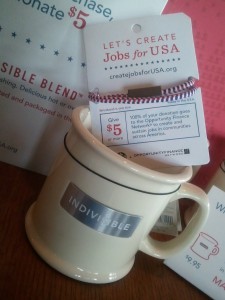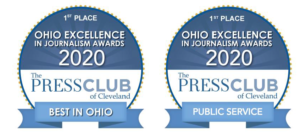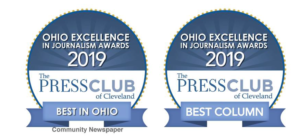Beginning today (Tuesday, June 12) Starbucks is selling a new ceramic coffee mug for $10. The novelty in this is that the mug is made in America – East Liverpool, Ohio, actually, which I’ve just learned was once the nation’s pottery capital. The mugs have their own display, separate from all the other ceramic mugs and travel cups that Starbucks sources from China.

This is part of an initiative by Starbucks CEO Howard Schultz to help rebuild American manufacturing. In addition to the mugs, for example, he has sourced production of Starbucks’ Via line of instant coffee to a new plant the company is building in Georgia, which will eventually employ 140 people, according to media reports.
I read about this in the New York Times. Ironically, I’ve just sent you to read the original article via a link at the India Times. Why? Two reasons: First, the New York Times‘ metering technology to limit the amount of free reading you can do seems to be glitchy today and won’t show me the story; second, it’s interesting that folks in India – the beneficiaries of so much of our own outsourcing – find it newsworthy when an American company chooses to employ American workers.
It’s good that Starbucks and CEO Schultz have turned their attention toward American employment. Americans are, after all, the people who still purchase 69% of everything Starbucks sells – despite the company’s agressive international expansion.
In the company’s most recent (2011) annual report, here’s what Schultz has to say about Starbucks’ initiative to support American workers:
Most recently we have focused on the high unemployment plaguing the United States, and I am proud that, as an organization, Starbucks is doing its part while appropriately supporting our business. We added approximately 3,700 net new jobs last year, and plan another 12,500 globally for 2012. But we can do more. That is why, in association with the Opportunity Finance Network, we launched Create Jobs for USA through which our customers can donate toward restarting the nation’s jobs engine through loans to community businesses. In addition to $5 million seeded by The Starbucks Foundation, approximately $2 million has been raised in the first two months and loans have begun flowing to small companies and community businesses across the country. Like Starbucks ethical sourcing, environmental and volunteer efforts, the Create Jobs for USA initiative is right for Starbucks because it authentically reflects the times we live in while being relevant to our brand.

I’m not the least bit cynical when I say that Schultz’ comments are welcome and helpful. It’s wonderful that Starbucks has seeded small business development efforts with $5 million of its own money; that’s nearly 0.3% – or 5 hours worth – of its 2011 profit of $1.73 billion.
Starbucks’ new mug promotion is credited with saving American Mug & Stein Co. – reportedly one of the last two remaining commercial potters in East Liverpool. American Mug is said to have doubled employment from this deal; payroll is now up to about 20 (another report put it at eight) and the owner says they’re considering adding some machinery for the first time in order to speed up production of their hand-made mugs.
So let’s see, if the entire Fortune 500 list of America’s largest companies would follow the example set by Starbucks, the company’s Let’s Create Jobs For USA initiative would be responsible for 10,000 manufacturing jobs (at companies that haven’t bothered to update their processes in about a hundred years). That’s just about the number of jobs cut across the United States between 2-4 p.m. on Thursday, Feb. 19, 2009 – the moment in time when I was delivered from corporate America.
I know how this sounds. Snarky, cynical and negative. That’s not because I have anything against Starbucks (OK, I think their coffee is somewhat bitter and overpriced, but other than that….)
Starbucks really is being a good corporate citizen. But the point is that Starbucks isn’t the problem any more than it is the solution. We are.
Cleveland Heights – a suburb of less than 50,000 people – is host to two Starbucks stores. We have at least four other independent coffee shops that I can count – five if you include a place that’s really just a bakery but offers a pretty good cup of coffee on the side.
If these shops behave like other independent merchants, they contribute far more to the local economy than Starbucks. Local merchants tend to donate more to community fund-raisers and local programs than national chains. Their owners spend profits close to home, while Starbucks’ corporate headquarters in Seattle tends to expect a hefty share of profits for itself.
There is, of course, nothing wrong with that. Corporations exist to make profit. But unlike the U.S. Supreme Court’s Citizens United ruling, I make a distinction between corporations and individuals. Individuals don’t exist for the will of corporations; it’s still the other way around, if only we individuals would keep that in mind.
We all still have options. Even though Wal-Mart insists that we’re idiots for shopping anywhere else, we can still choose to do so. And if we want to choose U.S. products over those made in China, India, Malaysia and wherever else, we need to choose independent businesses over corporations. Because independent merchants are more likely to buy from American sources.
If we want to choose U.S. employment over outsourcing to foreign lands, then we need to choose independent businesses over corporations. Because independent businesses are likely to hire most or all of their employees here at home, while corporations like Starbucks depend on international hiring to fuel their insatiable need to grow.
If we want to choose unique communities and walkable neighborhoods, then we need to choose independent businesses over corporations, because corporations favor high-traffic venues like Legacy Village and the upcoming Oakwood strip mall over comfortable commercial districts like Coventry and Lee Road.
If we want to choose rugged individualism over bland sameness, we need to choose independent businesses over corporations. Because independent businesses look for unique products that will capture our attention, while corporations look for high-volume goods that can be promoted and sold through economies of scale.
If the entire population of Cleveland Heights can change its habits – moving just $100 a person in annual purchases from big chains like Starbucks and Wal-Mart and Home Depot to little stores like Stone Oven, Zagara’s and Heights Hardware, we will have matched the seed money that giant Starbucks has dedicated to its small business development fund.
And we will be richer for it, because we will have provided more money to local independent merchants to spend with the schools, clubs, institutions and other businesses where they live. Which happens to be here rather than Seattle.
However many jobs it creates in America this year, Starbucks will create more jobs overseas, because that’s where it can achieve the easiest growth.
And someday – probably before the year is over – the novelty of those ceramic mugs from East Liverpool, Ohio, will expire. People will stop buying them. Starbucks will stop selling them. Somewhere between 10 and 20 people will lose their mug-making jobs.
And then what?



Leave a Reply